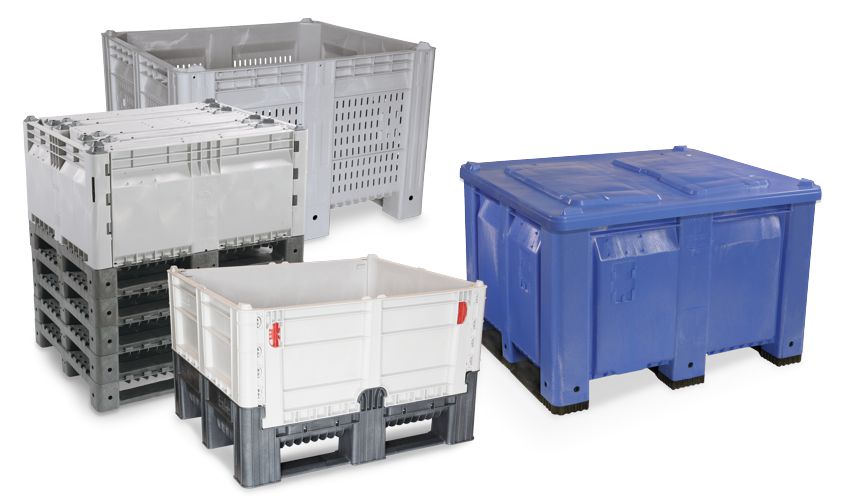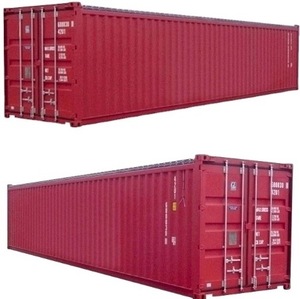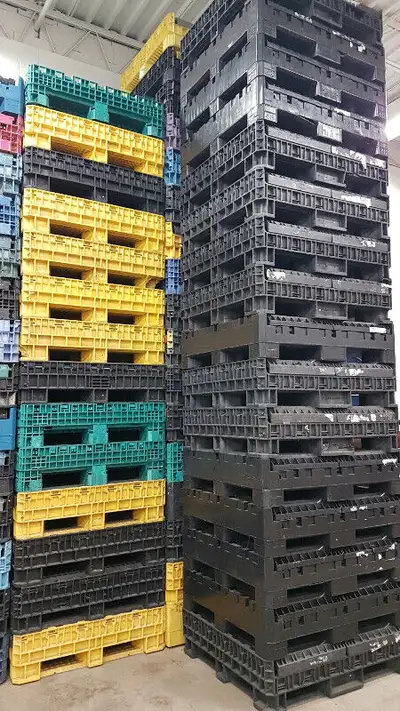Why Mass Containers Are Essential for Sustainable and Economical Transportation
Mass containers play an essential duty in modern logistics. They help with the effective motion of huge quantities of goods, consequently enhancing transportation processes. This approach not just lowers costs however likewise minimizes ecological influence with lower discharges and waste generation. As industries look for more sustainable methods, the fostering of mass containers is becoming significantly substantial. What implications does this change hold for future logistics and supply chain management?

The Benefits of Using Bulk Containers in Logistics
Mass containers change logistics by improving performance and sustainability. These containers enable the transportation of huge amounts of products in a solitary journey, significantly reducing the number of trips called for. This not only streamlines operations yet also minimizes labor expenses related to handling, loading, and discharging. Additionally, mass containers are created to enhance room application within transportation lorries, ensuring that even more items can be shipped simultaneously.
The standardization of bulk containers additionally streamlines the logistics procedure. With uniform measurements, they can be easily stacked and saved, resulting in boosted storehouse monitoring. Mass containers frequently feature durable products that protect materials from damage throughout transit, therefore decreasing item loss and boosting overall reliability. Because of this, organizations can experience improved supply chain performance, inevitably bring about raised productivity and client complete satisfaction. This mix of aspects makes mass containers an important possession in modern logistics.
Environmental Influence: Minimizing Waste and Carbon Footprint
As sectors increasingly focus on sustainability, the fostering of bulk containers has emerged as a key approach for minimizing waste and reducing carbon footprints. These containers decrease making use of product packaging materials, such as boxes and plastic, thus especially decreasing total waste generation. By consolidating deliveries, bulk containers boost transport performance, allowing for even more products to be transported per trip. This reduction in trips straight associates with reduced greenhouse gas emissions, adding to a smaller sized carbon impact.
Bulk containers can frequently be recycled or reused, even more mitigating environmental impact. The longevity of these containers guarantees they can stand up to several transport cycles, reducing the requirement for single-use options. used collapsible containers. By streamlining logistics and promoting effective source use, bulk containers not only support sustainable techniques but likewise encourage industries to align with international ecological objectives. Ultimately, their implementation shows a commitment to eco-friendly stewardship and liable resource administration
Price Cost Savings: Exactly How Mass Containers Lower Transport Expenditures
While lots of business seek ways to enhance their profits, using mass containers provides a significant possibility for lowering transportation expenditures. Bulk containers take full advantage of the volume of goods transported, allowing services to ship bigger amounts simultaneously. This efficiency minimizes the number of journeys needed, directly lowering gas prices and minimizing labor costs related to loading and discharging.
Furthermore, bulk containers typically include streamlined styles that maximize area utilization within transportation cars. This implies fewer vacant rooms, leading to much more reliable use available capacity. In addition, the resilience of bulk containers can reduce the risk of product damages during transit, lowering losses and making sure that even more products get here undamaged.
Enhancing Supply Chain Performance With Bulk Storage Space Solutions
Bulk storage space remedies play an essential function in enhancing supply chain performance by enhancing supply monitoring. By combining items right into less, larger containers, services can substantially reduce taking care of prices connected with constant transfers and processing. This streamlined method enables for far better monitoring and monitoring of stock, ultimately causing enhanced functional efficiency.
Structured Supply Monitoring
Effective stock monitoring is necessary for enhancing supply chain operations, particularly when companies take on bulk storage space remedies. These remedies enable companies to keep greater supply degrees while lessening the frequency of replenishment. By combining products right into bulk containers, firms can streamline their supply processes, decreasing the intricacy linked with tracking multiple smaller sized bundles. This approach assists in accurate stock matters and improves projecting accuracy, enabling for more enlightened decision-making. On top of that, bulk storage solutions simplify storage facility organization, making it less complicated to locate and access products when required. As an outcome, organizations can attain an extra efficient inventory turn over rate, inevitably boosting general supply chain efficiency and reducing the possibility of stockouts or overstock scenarios.

Minimized Handling Prices
The implementation of mass storage solutions not just streamlines stock administration but likewise considerably reduces dealing with costs across the supply chain. By consolidating materials into mass containers, companies reduce the requirement for regular handling and transfer in between various storage space and transportation units. This method reduces labor expenses connected with loading, unloading, and relocating smaller sized plans. Furthermore, mass storage space decreases the frequency of deliveries, bring about lower transport prices and decreased fuel usage. Because of this, services can enhance their logistics operations, enabling a more reliable appropriation of sources. Ultimately, reduced handling costs add to improved general supply chain performance, promoting an environment that sustains both sustainability and economic practicality.

Adaptability of Bulk Containers Across Different Industries
Although lots of sectors have distinct needs for transportation and storage space, mass containers have become a flexible service that meets a large range of demands. These containers, ranging from huge containers to specialized tanks, can suit diverse materials, consisting of powders, granules, and fluids. In the farming field, bulk containers assist in the transportation of fertilizers and grains, while the food and drink sector utilizes them for ingredients and ended up items. The chemical industry depends on bulk containers for safely carrying harmful materials, making certain conformity with safety laws. In addition, construction companies take advantage of bulk containers for delivering accumulations and other materials. Their versatility encompasses numerous settings of transport, consisting of ships, vehicles, and trains, improving logistical efficiency. This convenience not only streamlines procedures across different fields yet likewise promotes sustainability by decreasing product packaging waste and enhancing area in transit. Bulk containers play an important duty in modern supply chain monitoring.
Future Patterns in Mass Container Use and Sustainability
The future of bulk container usage is significantly shaped by ingenious products growth that improves sustainability. Additionally, automation in logistics promises to enhance procedures, decreasing waste and enhancing performance. Accepting circular economy methods will certainly even more change how bulk containers are made, used, and reused, fostering a much more lasting transportation landscape.
Cutting-edge Materials Growth
As industries increasingly prioritize sustainability, cutting-edge products development in mass containers becomes a significant consider enhancing environment-friendly great post to read transportation options. Manufacturers and scientists are discovering eco-friendly plastics, recycled composites, and lightweight metals to lower environmental influence. These materials not just lessen waste but likewise enhance gas effectiveness by reducing the total weight of containers. Additionally, advancements in wise materials, which can adjust to differing problems, enhance the longevity and functionality of mass containers. The integration of these cutting-edge materials lines up with circular economic situation principles, advertising reuse and recycling. As the need for lasting practices grows, the advancement of such materials will certainly play an important role in shaping the future of bulk container usage in logistics and transportation.
Automation in Logistics
Considerable innovations in automation are poised to transform logistics and the use of mass containers, enhancing sustainability in transportation. Automated systems, including drones and self-governing automobiles, are improving the movement of bulk containers, minimizing the dependence on typical fuel-powered transportation. These technologies optimize directing and loading processes, improving and decreasing empty miles gas performance. Additionally, automated stock administration systems improve tracking and monitoring of bulk containers, guaranteeing far better resource appropriation and lowered waste. The assimilation of the Web of Points (IoT) enables real-time information evaluation, allowing aggressive decision-making that straightens with sustainability objectives. As automation proceeds to evolve, it is expected to drive further technologies wholesale container usage, ultimately supporting even more sustainable logistics methods and reducing the environmental effect of transportation.
Circular Economic Situation Practices
Advancements in automation are setting the stage for a much more integrated method to round economic climate techniques in the domain name of bulk container usage. As sectors progressively embrace sustainability, bulk containers are being created for long life and reusability. This change not just lessens waste however likewise boosts resource effectiveness. Companies are embracing methods such as closed-loop systems, where utilized containers are collected, reconditioned, and reestablished right into the supply chain. Additionally, smart innovations track container life process, facilitating much better management and decreasing ecological impact. The collaboration in between producers, logistics service providers, and end-users is important in establishing requirements for lasting container usage. refurbished bulk containers. Future fads indicate an expanding emphasis on products that are recyclable and biodegradable, additional strengthening the round economic situation's principles wholesale transportation

Frequently Asked Questions
What Products Are Bulk Containers Usually Made From?
Mass containers are commonly created from sturdy products such as high-density polyethylene, cardboard, light weight aluminum, and steel. These materials offer adaptability, toughness, and defense, making them suitable for transferring various products in different markets efficiently.
Just how Do I Pick the Right Size Mass Container?
Picking the ideal size bulk container entails reviewing the quantity of products to be transported, taking into consideration handling tools compatibility, and evaluating storage space requirements. Proper explanation dimension guarantees performance in transportation and lessens waste during delivery.
Are Bulk Containers Reusable or Recyclable?
Bulk containers are usually recyclable, created for multiple journeys, improving sustainability. Many can likewise be reused, depending upon the materials made use of. Choosing recyclable alternatives better reduces and sustains ecological goals waste in transport techniques.
What Safety Laws Apply to Mass Container Transportation?
Security policies for bulk container transportation include compliance with the Division of Transport standards, appropriate labeling of unsafe materials, structural integrity evaluations, and adherence to weight restrictions to assure safe handling and protect against accidents during transit.
Exactly How Can Companies Transition to Making Use Of Bulk Containers Effectively?
Organizations can alter to bulk containers by assessing existing logistics, training team on handling, buying suitable tools, optimizing supply monitoring, and working together Resources with distributors to assure compatibility and effectiveness throughout the supply chain.
As industries significantly focus on sustainability, the fostering of bulk containers has arised as a key technique for minimizing waste and lowering carbon footprints. By consolidating products into bulk containers, companies can simplify their inventory procedures, decreasing the intricacy associated with tracking several smaller packages. As markets increasingly focus on sustainability, innovative materials growth in bulk containers emerges as a considerable variable in enhancing green transport options. Automated systems, including drones and independent cars, are enhancing the motion of bulk containers, reducing the dependence on standard fuel-powered transport. Additionally, automated supply monitoring systems improve monitoring and tracking of mass containers, ensuring far better resource allowance and decreased waste.